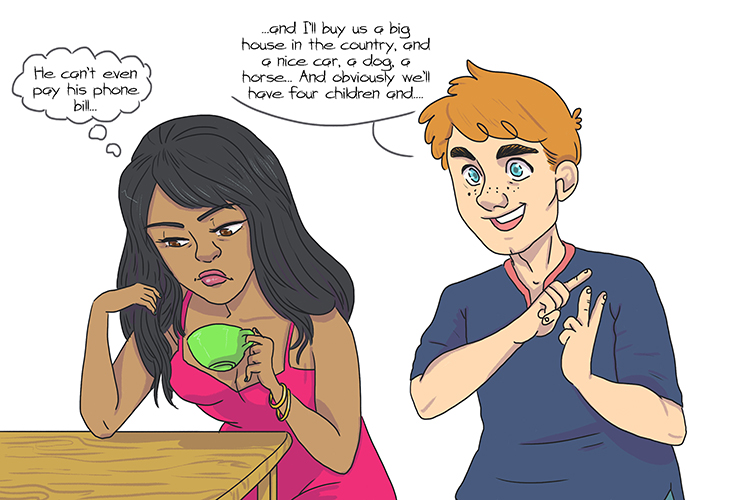Effects of tenses
It’s worth repeating that tenses are a LANGUAGE FEATURE. Every language feature has an effect and, for tenses, we can define these effects as follows:
Past tense
Past tense tends to distance the reader from events.
 (2).jpg)
She walked past (past tense) on the opposite side of the street to distance herself from the drunks on the pavement.
Past tense is fine for history, where there is perhaps always a sense of distance due to the time factor, but generally not so for creating excitement and immediacy, which is a requirement of many fiction books. However, past tense is more flexible than present tense: it can go anywhere in time from billions of years ago up to a moment ago without the tense having to change.
Present tense
Present tense adds an element of excitement and immediacy – and a sense of closeness to the narrator.

Her present (present tense) was a puppy that created excitement, but it immediately (immediacy) peed on the floor.
When pieces are written in present tense, it is as though the reader is on a journey with the writer NOW, discovering things in real time as the narrator of a story reveals what is happening AS IT ACTUALLY HAPPENS. However, it is more restrictive than past tense, as it can only deal with what is happening NOW. To go back in time would need a tense change or at least some kind of statement to make it clear the events are now moving to a different time.
Consider the difference between:
- I load the gun and take careful aim. (Present tense)
and
- I loaded the gun and took careful aim. (Past tense)
Do you find yourself reacting more to the first, present-tense version? Does it make you feel closer to what is happening? That is the normal reaction, and that is the effect of present tense.
A drawback with present tense is that, because of its very nature, it is sometimes much harder for the writer to cover the whole picture. When the events are happening right now, it can be difficult to make clear how they came about because there’s much less opportunity to give background information.
Future tense
There’s often an element of uncertainty about lines written in the future tense. From a Government minister claiming “The national debt will be paid off in five years’ time” to the gospel song “We shall overcome someday”, it’s by no means certain that what is claimed will actually take place.

She was tense about the future (future tense) – he said he wanted to marry her and buy a big house, but she felt uncertain about it.
Future tense is perhaps the least used. Pieces are rarely written entirely in future tense – it is used, usually sparingly, in pieces mainly written in past or present tense, when the need arises to refer to something that will or may happen in the future, or in quotations (dialogue, or speech) from characters, commentators, etc.
Future tense could be used for the entirety of an article about what might happen in the future, for instance:
“Cars will be electric and autonomous, TVs will be the walls of our living rooms and robots will tend people’s gardens which, by law, will have to be ecologically friendly. All windows will be self-cleaning, plastic will be outlawed, computer displays will be holographic...” and so on.
That, however, is an exception to the way future tense is generally used, which is sparingly. As you can tell from the above, future tense quickly becomes tedious if used too much.
Future tense is often speculative (based on an idea or opinion rather than true knowledge), or carries some kind of warning, for example:
- “We might see the ocean reach the middle of the village in two hundred years if coastal erosion continues at this rate.” (Speculative)
- “You’ll never get to heaven if you break my heart.” (Warning)
- “You will go blind if you do that!” (Warning)




